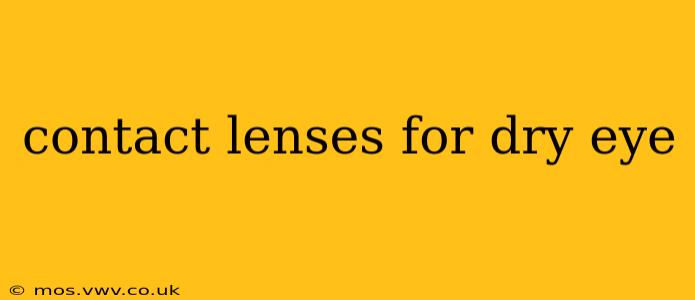Dry eye syndrome is a common condition affecting millions, causing discomfort and impacting vision. For contact lens wearers, dry eye can be particularly challenging. Fortunately, advancements in contact lens technology offer solutions designed to alleviate dryness and improve comfort for those with dry eyes. This comprehensive guide explores various contact lens options and considerations for managing dry eye while maintaining clear vision.
What are the Best Contact Lenses for Dry Eyes?
The "best" contact lens for dry eyes depends on the individual's specific needs and the severity of their dry eye condition. However, several types of lenses are generally better suited for managing dryness than others:
-
Silicone hydrogel lenses: These lenses are highly breathable, allowing significantly more oxygen to reach the cornea than traditional hydrogel lenses. This increased oxygen permeability helps to maintain the health of the cornea and reduces the risk of dryness and irritation. Many silicone hydrogel lenses are specifically designed for dry eye sufferers, offering enhanced moisture retention and comfort.
-
Daily disposable lenses: Daily disposables eliminate the need for cleaning and disinfecting lenses, reducing the risk of lens-related complications that can exacerbate dry eyes. Fresh lenses each day mean you're always wearing a clean, sterile lens, minimizing the buildup of irritants.
-
Large diameter lenses: Lenses with larger diameters can sometimes distribute tears more evenly across the eye's surface, providing better lubrication and reducing the feeling of dryness.
-
Lenses with moisturizing agents: Some contact lenses incorporate moisturizing agents or surface treatments to enhance comfort and reduce dryness. These agents can help retain moisture on the lens surface, promoting a more comfortable wearing experience.
What Types of Contact Lenses Should I Avoid if I Have Dry Eyes?
Conversely, certain types of contact lenses can worsen dry eye symptoms:
-
Extended-wear lenses: While convenient, extended-wear lenses can increase the risk of complications, including dry eye, due to the prolonged period of wear. The lack of regular cleaning and removal allows debris and irritants to accumulate, potentially leading to dryness and discomfort.
-
Conventional hydrogel lenses: These lenses are less breathable than silicone hydrogel lenses, leading to decreased oxygen flow to the cornea. This reduced oxygen permeability can contribute to dryness and irritation, making them less suitable for those with dry eyes.
-
Rigid gas permeable (RGP) lenses: Although RGP lenses offer excellent visual acuity, they can sometimes be less comfortable for those with dry eyes. Their rigid nature can disrupt the tear film, leading to dryness and irritation.
Are there Specific Brands of Contact Lenses Good for Dry Eyes?
Many reputable brands offer contact lenses specifically designed for dry eyes. It's crucial to consult with your eye care professional to determine which brand and lens type are most appropriate for your individual needs. They can assess the severity of your dry eye condition and recommend the best option for optimal comfort and vision. Researching specific brand offerings and technologies, like those focusing on hydration and oxygen transmissibility, can also be beneficial.
How Often Should I Replace My Contact Lenses if I Have Dry Eyes?
The frequency of contact lens replacement is crucial for managing dry eye. Daily disposable lenses are often recommended for individuals with dry eyes due to the reduced risk of complications. However, your eye doctor will determine the appropriate replacement schedule based on your specific lens type, condition, and individual needs.
Can I Use Lubricating Eye Drops with Contact Lenses?
Yes, using lubricating eye drops with contact lenses is often recommended for individuals with dry eyes. Ensure you use eye drops specifically designed for contact lens wearers to avoid damaging your lenses or causing discomfort. Always follow the instructions provided by your eye care professional regarding the appropriate type and frequency of use.
How Do I Choose the Right Contact Lenses for My Dry Eyes?
Choosing the right contact lenses for dry eyes requires a thorough eye examination by an optometrist or ophthalmologist. They will assess the severity of your dry eye, evaluate your corneal health, and discuss your lifestyle to determine the most suitable lenses. Don't hesitate to openly discuss your concerns regarding dryness and comfort during your consultation.
This guide provides general information; a personalized consultation with an eye care professional is essential to determine the best contact lens solution for your specific dry eye condition. They will help you select lenses that provide optimal comfort, vision, and eye health.
